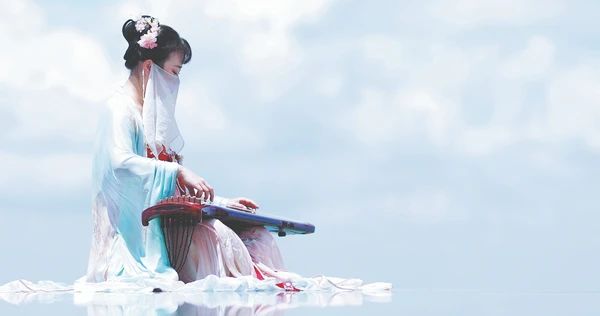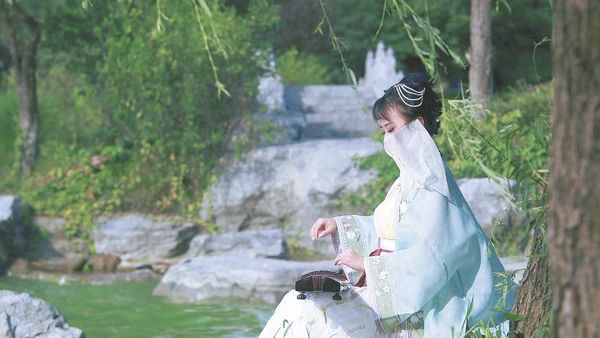The many charms of an ancient instrument
Against a serene natural backdrop, like sunlight flickering on the surface of a lake, or a vast, flower-strewn meadow, and clad in traditional Chinese attire, guqin player Xu Chaoran aims to create an immersive experience for her audience.

▲Video blogger Xu Chaoran has been uploading videos where she dons traditional Chinese attire and plays the guqin. Many of her videos are filmed in natural surroundings, because she wishes to take her guqin on a journey around China. She is known for her adaptations of contemporary songs so as to draw more people into learning about the instrument. CHINA DAILY
Better known online as Mr Nanyi — like a female hero in martial arts novels, Xu adopted a male alias when she decided to start uploading videos of her playing the guqin just over seven years ago. The seven-stringed Chinese zither, which is China's oldest stringed instrument, has been around for about 3,000 years, and was inscribed in 2008 on UNESCO's Representative List of the Intangible Cultural Heritage of Humanity. Xu is best known for putting it to modern use, playing her own adaptations and rearrangements of popular songs.
With an innate passion for music and art, Xu studied various arts as a youngster, from dancing and learning to play the guzheng (the Chinese plucked zither), to learning Western instruments like the guitar, piano and clarinet.

▲Video blogger Xu Chaoran has been uploading videos where she dons traditional Chinese attire and plays the guqin. Many of her videos are filmed in natural surroundings, because she wishes to take her guqin on a journey around China. She is known for her adaptations of contemporary songs so as to draw more people into learning about the instrument. CHINA DAILY
"As a child, I had an affinity for traditional Chinese music, and learning Chinese instruments came more naturally to me. After all, the five notes of the traditional pentatonic scale flow in my blood," she says.
Xu's experience of learning the guzheng, which she first took up at the age of 9, gave her a solid foundation for learning the guqin. The other instruments she learned to play also contributed to her musical journey, by giving her a better understanding of harmony and the balance between tension and release, for example.
Xu entered the Wuhan Conservatory of Music in Hubei province in 2009, to specialize in traditional Chinese music. As the conservatory encourages students to expand their learning, she chose to add the guqin to her repertoire, an instrument she had long considered both venerable and elegant.
After graduation, she continued to improve her playing while giving guqin lessons at her teacher's studio, and occasionally performing at commercial events before opening up a studio of her own.
"I feel that the guqin is something I'm willing to work on for a lifetime. To be able to master the instrument, teach it properly, and carry on its tradition takes a lot of effort, and comes with great responsibility. There's so much to be done," Xu says.
In addition to teaching, she embarked on a new journey into the realm of social media. Some of her first videos later became trademarks, and her rearrangements of contemporary music, such as popular songs or TV series theme songs, have been published in two books.
"The reason I rearrange and adapt these songs is because I believe that the guqin has strong, expressive power," Xu says. "It's not limited to playing traditional pieces. In fact, some of today's music can also be played on the guqin, showcasing the instrument's unique charm in the process."
Many of Xu's videos are filmed in natural surroundings, which she says reflects her wish to take her guqin on a journey through the varied landscapes of China.

▲Video blogger Xu Chaoran has been uploading videos where she dons traditional Chinese attire and plays the guqin. Many of her videos are filmed in natural surroundings, because she wishes to take her guqin on a journey around China. She is known for her adaptations of contemporary songs so as to draw more people into learning about the instrument. CHINA DAILY
She uploads the videos to popularize the instrument, so that more people are able to appreciate its charms and also learn about it, which also helps deepen their understanding of traditional Chinese culture.
One top comment on one of her videos says: "The moment the first note is struck, there is a sensation that seems to reach the soul. The distant, ethereal sound of the guqin creates an instant resonance in me."
Xu believes that the mesmerizing sound of the guqin has the power to fill the heart with peace, and says that, contrary to the tranquil and solemn quality of her videos, she is actually outgoing and vivacious in real life.
"Every time I practice the guqin, I find sanctuary. When I close my eyes as I play, the deep resonance of a single note can give me the sensation of enlightenment, so that when I open my eyes again, everything seems more lucid," Xu says.
"Studying a particular piece also involves learning the history and culture it embodies. When I started to learn about the mindset and aesthetics of the guqin players of the past, I began to truly grasp the breadth and depth of traditional Chinese culture."
While she continues to teach and make videos, Xu feels that she needs to improve her own ability to strike a balance between tradition and innovation.
This includes honing her techniques, so that she is able to more faithfully interpret and present ancient music, as well as leveraging the strengths of the guqin, and preserving its integrity as she makes adaptations.
In 2021, Xu was taken on as a private student by Zhao Jiazhen, a professor at the Central Conservatory of Music in Beijing and a national-level inheritor of the guqin.
"I feel happy that through my videos, I've been able to draw people into guqin music, and some have even started learning to play. This brings me immense joy," Xu says.
Reporter: Cheng Yuezhu
